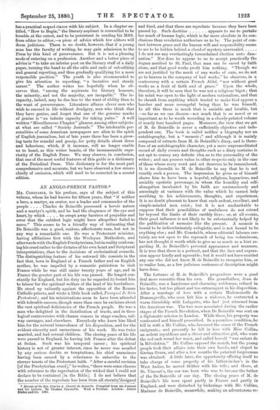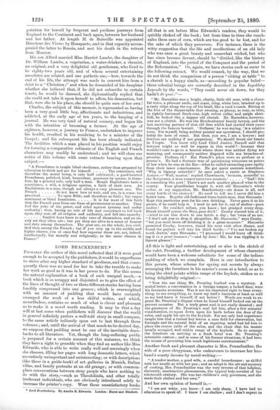AN ANGLO-FRENCH PASTOR.*
Mt. CONSTABLE, in his preface, says of the subject of this volume, whom he had known for fifteen years, that " if neither a hero, a martyr, an orator, nor a leader and commander of the people . . . . Charles de Boinville possessed a heroic nature and a martyr's spirit, and he had the eloquence of the eye and heart, by which . . . . he swept away barriers of prejudice and error that the subtlest logic might have altogether failed to move." This seems to be a friendly way of intimating that De Boinville was a good, zealous, affectionate man, but not in any way a remarkable one. He was a Protestant minister, having affiliations first with the Wesleyan Methodists, and afterwards with the English Presbyterians, but in reality conform- ing his creed rather to the dictates of his own heart and Scriptural interpretations, than to the decisions of ecclesiastical councils. The distinguishing feature of his outward life consists in the fact that, born in England of a French father and an English mother, he was impelled by a romantic patriotism to visit France while he was still Tinder twenty years of age, and in France the greater part of his life was passed. He longed con- stantly for England, but his duty (as he regarded it) bound him to labour for the spiritual welfare of the land of his forefathers. He stood up valiantly against the opposition of the Roman Catholic priests, and wrote a little book called, Pourguoi Suis Protestant ; and his ministrations seem to have been attended with tolerable success, though more than once he exclaims about the vast spiritual deficiencies of the French people. He was a man who delighted in the distribution of tracts, and in theo- logical controversies with chance comers in stage coaches, rail- way carriages, and elsewhere. Everybody who knew him liked him for the natural benevolence of his disposition, and for the evident sincerity and earnestness of his work. He was twice married, and had several children. The closing years of his life were passed in England, he having left France after the defeat at Sedan. Such was his temporal career ; his spiritual history is not of greater interest, since he never was assailed by any serious doubts or temptations, his chief uneasiness having been caused by a reluctance to subscribe to the sterner tenets of the Protestant faith. "After a careful revision [of the Presbyterian creed]," he writes, "there were some clauses with reference to the reprobation of the wicked that I could not declare to be contained [in the Bible]. I do not believe that the number of the reprobate has been from all eternity ,designed * Memoir of the Rev. Charles A. Chattel de Boints7 le. Complied from his 'carpal and Ms Letters. By Thomas Constable. 'With a Portrait. London: James Nisbet and Co. use.
and fixed, and that these are reprobate because they have been passed by. Such doctrine appears to me to partake too much of human logic, which is far more absolute in its con- clusions than revelation authorises us to be. The point of con- tact between grace and the human will and responsibility seems to me to be hidden behind a cloud of mystery unrevealed I do not see any everlastingly foreordained election unto dam- nation." Nor does he appear to us to accept practically the dogma ascribed to St. Paul, that man can be saved by faith alone, and that good works profit him nothing. "Though we are not justified by the merit of any works of ours, we do not go to heaven in the company of bad works," he observes, in a controversy with a certain French Abbe, " nor without good works as a fruit of faith and of grace." Upon the whole, therefore, it will be seen that he was not a religious bigot ; that his mind was open to the light of modern rationalism, and that he shrank from anything which tended to make God appear a harsher and more revengeful being than he was himself. In all this there is much that is amiable and lovable, but —so far as we can discern—not much that is so novel or so important as to be worth recording in a closely-printed volume of nearly four hundred pages. Moreover, the view that we get of M. de Boinville is never a sufficiently objective and inde- pendent one. The book is called neither a biography nor an autobiography, but a " memoir ;" and although it is mainly composed of extracts from M. de Boinville's diary, and is there- fore of an autobiographic character, yet a mere unpremeditated record of daily events and thoughts such as a diary contains is not apt to convey any definite idea as to the personality of the writer ; and can possess value in other respects only in the case of those whose every word and act deserves to be remembered. It is no discredit to M. de Boinville to say that he is not exactly such a person. The impression be gives us of himself shows him to have been a. hopeful, religious, loquacious, and amiably egotistic personage, in whom the humility and self- abnegation inculcated by his faith are unconsciously and amusingly at variance with the value which he cannot help ascribing to his achievements, thoughts, and experiences. It is no doubt pleasant to know that such ardent, excellent, and simple-minded men exist ; but it is not uncharitable to suppose that their possibilities of usefulness do not extend far beyond the limits of their earthly lives ; or, at all events, their good influence is not likely to be substantially helped by the publication of memoirs like the present. A memoir is bound to be indiscriminately eulogistic, and is not bound to be anything else ; and Mr. Constable, whose editorial labours cer- tainly are not open to the reproach of being too voluminous, has not thought it worth while to give us so much as a hint re- garding M. de Boinville's personal appearance and manners. It is true that there is a portrait, and that the face and expres- sion appear kindly and agreeable; but it would not have enabled any one who did not know M. de Boinville to recognise him, or to realise him, as a few judicious sentences of description might have done.
The fortunes of M. de Boinville's progenitors were a good deal more romantic than his own. His grandfather, 'Jean de Boinville, was a handsome and charming nobleman, refined in his tastes, but too pliant and too extravagant in his disposition. After a marriage of love with a certain Mademoiselle de Domaugeville, who soon left him a widower, he contracted a warm friendship with Lafayette, who had just returned from the American war. The two were associated during the earlier stages of the French Revolution, when De Boinville was sent on a diplomatic mission to London. While there, his property was confiscated and himself proscribed. In a penniless condition, he fell in with a Mr. Collins, who favoured the cause of the French emigrants ; and presently he fell in love with Miss Collins an ardent republican and a clever and attractive girl, who wore the red sash round her waist, and called herself " une enfant de la Revolution." Mr. Collins opposed the match, but the young people took their affairs into their own bands, and eloped to Gretna Green, and after a few months the paternal forgiveness was obtained. A little later, the opportunity offering itself to take charge of some property of his father-in-law's in the West Indies, he moved thither with his wife ; and there, at St. Vincent's, the son was born who was to become the father of the De Boinville of our day. The closing years of M. de Boinville's life were spent partly in France and partly in England, and were disturbed by bickerings with Mr. Collins, Madame de Boinville, meanwhile, making an adventurous re-
imitation for herself by frequent and perilous journeys from England to the Continent and back again, between her husband and her father. At length M. de Boinville was appointed Directeur des Vivre3 by Bonaparte, and in that capacity accom- panied the latter to Russia, and met his death in the retreat from Moscow.
His son Alfred married Miss Harriet Lambe, the daughter of Dr. William Lambe, a vegetarian, a water-drinker, a chemist, an original, and a very delightful old gentleman, who lived to be eighty-two years old, and of whom several entertaining anecdotes are related, and one pathetic one,—how, towards the end of his life, the attempt was made to convert him from a deist to a " Christian ;" and when he demanded of his daughter whether she believed that, if he did not subscribe to certain tenets, he would be damned, she diplomatically replied that she could not take it upon herself to affirm his damnation, but that, were she in his place, she should be quite sure of her own !
Charles, the subject of this memoir, is represented as having been a very good little boy, affectionate and industrious, and addicted, at the early age of ten years, to the keeping of a journal. He was very fond of natural scenery, and began life with the intention of becoming a farmer. At the age of eighteen, however, a journey to France, undertaken to improve his health, resulted in his resolving to be a minister of the Gospel ; and his subsequent life has been already indicated. The facilities which a man placed in his position would enjoy for forming a comparative estimate of the English and French characters may readily be understood ; and we will close our notice of this volume with some extracts bearing upon that subject :-
"A Frenchman is taught blind obedience, rather than prepared by
education to think and act for himself The conscience, and therefore the moral being, is only half cultivated ; a good-hearted Frenchman, polished, kind, benevolent, generous by nature, is there- fore, by a general rule, only half a man. Rough Englishmen have a conscience, a will, a religious opinion, a faith of their own. An Englishman is a man, though not always a very pleasant one. The French do not know how to wait, and are, in a sense, too practical No open Bible, and therefore no faith ; but vague sentiment or blind fanaticism It is for want of this faith that the French pass from one form of government to another. They feel the yoke of the priest, and rebel against tyranny and undue authority ; then, having no rule of life and conscience to fall back upon, they cast off all religion and authority, and fall into anarchy.
English boys learn to take care of themselves, and an un- ruly set they often are ; but yet they are alive to a sense of honour and duty among themselves. The poor are, on the whole, less civil- ised than among the French ; bat if you step up to the middle and higher classes, you at once feel how superior those are, not, indeed, intellectually, but morally and religiously, to the same classes in France."



































 Previous page
Previous page